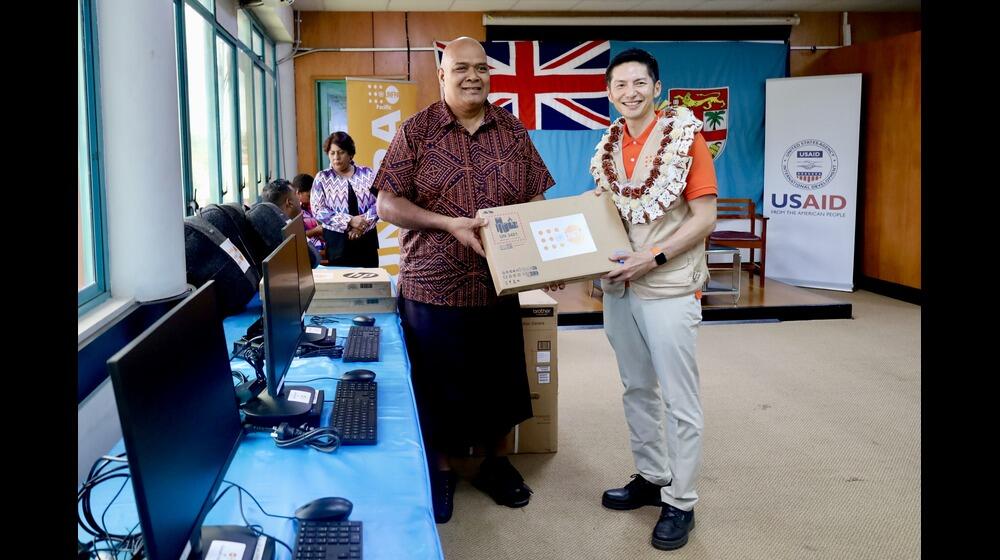NORTHERN DIVISION, Fiji - On World Humanitarian Day (19 August), the United Nations Population Fund (UNFPA) Pacific team is on the ground gearing up its assistance to support the local government and communities for enhancing ‘climate resilience’ particularly for, and by, women and youth. This pilot initiative that UNFPA Pacific has commenced in Fiji is aimed at fortifying disaster preparedness and response capabilities, addressing the humanitarian-development nexus surrounding climate crises as well as public health emergencies.
On this year’s World Humanitarian Day with the global theme of #NoMatterWhat, UNFPA Pacific donated sewing machines, brush cutters, gum boots, refrigerator and other items to women and young people in Korotubu Village on Vanua Levu Island, situated near the Pacific ocean approximately 45 minutes from the Northern Division’s center town Labasa.
Eseromi Sivivatu, Leader of the village’s Uuisori Youth Club , expressed the whole village’s enthusiasm about this pilot initiative. “We will use these tools received from UNFPA to generate income for our village and collectively save money to use for preparedness and response to any future disaster,” said Sivivatu, standing beside his neighbor woman working on a sewing machine. These resources are intended to bolster ‘community resilience’ and facilitate more effective recovery from future climate crises or health pandemics. “We have never been this excited to work together in coming up with new ideas and acquire valuable skills to help our community to better prepare for any emergency and build back better,” Sivivatu extended the villagers’ gratitude to UNFPA.
Especially since the Vanua Levu Island was hit hard by the consecutive large-scale Tropical Cyclones Yasa and Ana in 2020-2021, UNFPA Pacific has been collaborating closely with the Northern Division Commissioner's Office and vulnerable villages. The focus is on empowering local governments, communities, especially women and youth, to collectively enhance risk reduction, climate change adaptation and humanitarian response capabilities. As part of its continued commitment to addressing the climate-humanitarian-development nexus, UNFPA Pacific also donated a comprehensive set of IT equipment (desktops, laptops, projector, printer, etc) and chairs to the ‘Command Center’ of the Northern Division Commissioner’s Office.
Highlighting UNFPA’s role as a major ‘UN humanitarian data agency,’ Mr. Iori Kato, UNFPA Director for the Pacific and Representative in Fiji, emphasized the potential of the donated equipment to enhance the Divisional Commissioner's Office capacity to function as an effective command center. This functionality, powered by enhanced data management capability, aims to improve evidence-based planning, execution and monitoring of disaster preparedness and response activities, including the refinement and analysis of up-to-date "Community Profiles" in the Northern Division.
“UNFPA’s assistance focused on women and young people is unique and makes good development and humanitarian sense, as women are the backbone of the households and young people are the foundation of our communities’ future. Investing in them is vital for the sustainable development of our Division and the whole country.” Honourable Commissioner of Northern Division, Mr. Uraia Rainima appreciated UNFPA Pacific's timely donation. “What was given to us on the World Humanitarian Day 2023 will not be forgotten by everyone in this Commissioner’s Office and communities in the Northern Division in the years to come.”
UNFPA Director Kato echoed the Division Commissioner. “What happened to the Northern Division since TCs Yasa and Ana two years ago, is an eloquent testimony to the fact that climate crises and other emergencies erode the hard-won gains and progress in reproductive and adolescent health and in overall gender equality.” Kato underscored the unfortunate trend globally and also here in the Pacific that, in many emergencies , women, girls, boys, and persons with disabilities face increased risks of violence during and in the aftermath of such emergencies, as well as a rise in maternal deaths, unwanted pregnancies, and psychological traumas. “We in UNFPA Pacific are therefore hoping that our humble catalytic investments and donations that we hand over today, will contribute to scaling up the community resilience building, based also on this noble local culture and spirit of “Sole sole vaki,” for women, young people, and the whole community themselves to help ensure that such efforts are successful and sustained.”
Mr. Kato extended gratitude also to funding partners, including the United States Agency for International Development (USAID) Bureau of Humanitarian Assistance (BHA) and the European Union-United Nations Spotlight Initiative. These collaborations, coupled with UNFPA's core resources, facilitated these tangible contributions to local governments and communities, enhancing preparedness and resilience in anticipation of another cyclone season approaching.
UNFPA Pacific is committed to furthering its support for the Fijian Government and its people, collaborating closely with partners including the Ministry of Rural and Maritime Development and Disaster Management. This effort is a part of UNFPA’s new 7th five-year Multi-Country Programme for 14 Pacific Small Island Developing States including Fiji, spanning from 2023 to 2027.


